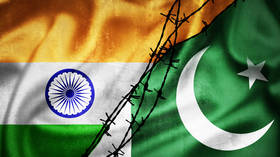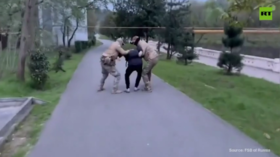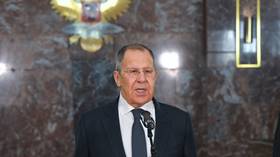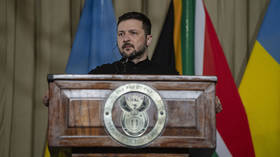Syria peace talks in Geneva
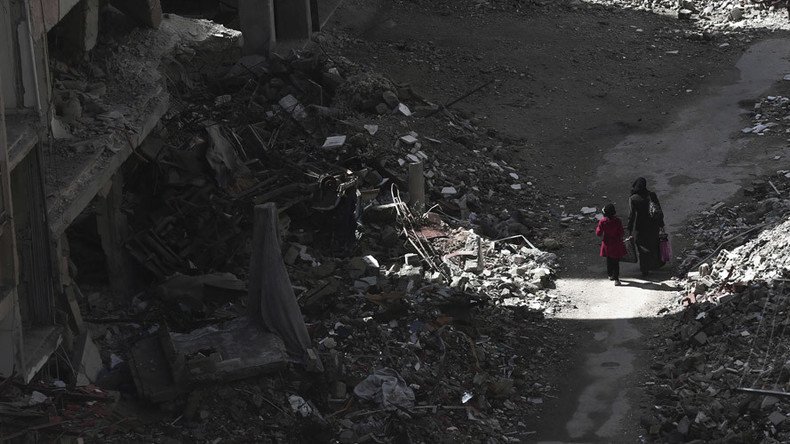
With procedural matters having interfered with the negotiations, the Syria talks in Geneva have been “temporarily halted” until February 25. When selected issues have been resolved, the process will continue, according to UN special envoy for Syria, Staffan de Mistura.
03 February 2016
19:20 GMTMilitary action in Syria has not been discussed at the talks in Geneva, UN special envoy for Syria, Staffan de Mistura, said on Wednesday according to TASS.
- 18:03 GMT
UN envoy Staffan de Mistura announced on Wednesday that the Syria talks in Geneva are to be “temporarily halted” until February 25.
The UN official said that he was not frustrated or disappointed with the process, but has to be realistic.
Citing difficulties with select procedural matters for the break in talks, de Mistura said he remained determined to continue with the negotiations.
Countries backing the talks will be asked to meet again immediately to resolve the issues, he added.
The announcement came following a meeting with the opposition delegation.
“I have concluded frankly that after the first week of preparatory talks there is more work to be done, not only by us but by the stakeholders," the UN envoy told reporters, adding that the talks are not being undertaken “for the sake of talking.”
02 February 2016
20:09 GMTUN Envoy to Syria Staffan de Mistura didn’t exclude the possibility that the peace talks could fail.
Speaking to Swiss television channel RTS he said complete failure is “always possible, particularly after five years of a horrible war, where the sides hate each other, where there is a huge lack of confidence.”
However, he urged to make all efforts to resolve the conflict politically.
"If there is a failure this time after we tried twice at conferences in Geneva, for Syria there will be no more hope. We must absolutely try to ensure that there is no failure."
He added that Russia and the United States both had an interest in stopping the five year war.
Staffan de Mistura dans les studios de la RTS prêt pour son interview #19h30 par @DariusRochebin#SyriaTalkspic.twitter.com/GBeFtxDC31
— Madeleine Brot (@MadeleineBrot) February 2, 2016- 20:00 GMT
UN Special Envoy to Syria Staffan de Mistura has said that "concrete" changes are needed in order for the peace talks to succeed. He said that the talks were a challenge as trust between both sides was "close to zero".
"The test of whether these talks are going to be serious will be... if something changes on the ground while we are doing talks," he told the BBC in Geneva. "We need something concrete. Otherwise, we, the UN, will be the first one to say 'thank you, but we are looking for something concrete here'.
- 19:56 GMT
Syrian opposition negotiator Mohamed Alloush, representing Jaysh al-Islam (Army of islam), which is considered to be a terrorist group by Damascus and Moscow, said that he was not optimistic about the prospects for peace talks. "Nothing has changed in the situation on the ground so as long as the situation is like this we are not optimistic," he told reporters.
- 19:34 GMT
The participation of Kurds in the Syrian peace negotiations is still being discussed, said Russian Deputy Foreign Minister Gennady Gatilov after bilateral talks with Syria’s warring sides in Geneva. He said that UN envoy to Syria Staffan de Mistura promised to keep “working on official invitations” to the Kurdish delegation, despite their participation being rejected by Turkey. Gatilov added that he hopes that Kurdish representatives will take part in the talks in the future.
- 19:34 GMT
Russian Deputy Foreign Minister Gennady Gatilov said speaking to reporters in Geneva that the Syrian opposition is not unified and cannot “determine who will be representing them.”
“This is an important factor, because, politically, a lot will depend on the composition of the delegation,” he said.
Therefore, the stalling of the negotiation process and the “unconstructive position” of the Syrian opposition may look like an “intention to block the start of negotiations," he added.
De Mistura is scheduled to hold a meeting with the opposition to clarify its members in the delegation, Gatilov said adding that “it’s possible that the list will be incomplete, and with time these vacant positions will be taken by other representatives.”
He hinted that there might be a possibility that the talks will take longer that the six months which were set by the UN. He also expressed hope that the Munich Security Conference which is to take place later in February will give an “impulse” to the intra-Syrian negotiations.
- 19:33 GMT
Russian Deputy Foreign Minister Gennady Gatilov told reporters in Geneva that he held a meeting with the Syrian opposition and with other partners, who are taking part in the talks.
- 15:42 GMT
The Syrian opposition said it will not attend the meeting with the UN envoy scheduled for the afternoon, AFP reported. The UN office of the Special Envoy to Syria, Staffan de Mistura, has confirmed that it has no more meetings planned for the day.
- 14:43 GMT
The participation of members associated with the Jaysh Al-Islam (Army of Islam) and Ahrar Al-Sham (the Islamic Movement of the Free Men of the Levant) in the “proximity talks” in Geneva does not mean the groups’ official recognition, said Russian Foreign Minister Sergey Lavrov after talks with his UAE counterpart Abdullah bin Zayed Al Nahyan.
Lavrov said that they are participating to make sure the decision taken during the talks Syria’s future is based on a “realistic approach.”
"We have reached an agreement (and the government delegation agreed with this) that these people, if they take part in the negotiation processes, will do so in their personal capacity, that they will accept all the requirements of Resolution 2254 of the UN Security Council,” he said. "The participation in their personal capacity does not mean - and this is accepted by all, including the US - these groups' recognition as negotiating partners."
"That's our stance, just as the stance of many other members of the Syrian Support Group who regard these groups as terrorists,” he added.
Press Conference of Lavrov & Emirates' FM Mohamed bin Zayed Al Nahyan/ Пресс-конференция С.Лаврова с главой МИД ОАЭ pic.twitter.com/1sUk8Ncghu
— MFA Russia (@mfa_russia) February 2, 2016



